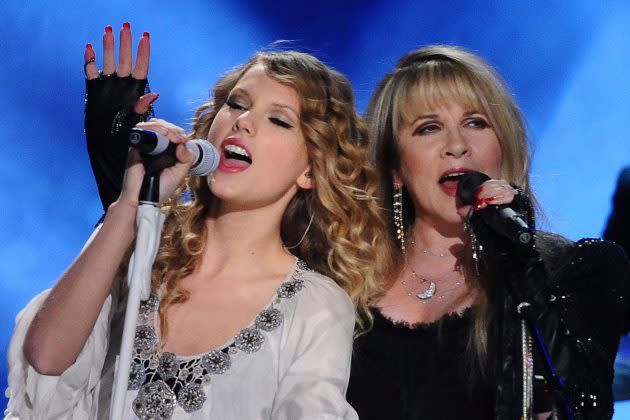Stevie Nicks and Taylor Swift Both Wrote Revealing Poems for ‘Tortured Poets Department’ Album Package

Taylor Swift usually writes either an essay or poem to be included in her album packaging, but for “The Tortured Poets Department,” she used the buddy system. Stevie Nicks contributed a handwritten poem she wrote for Swift, which is the first thing fans will see when they open the LP gatefolds or CD booklets Friday morning.
That doesn’t mean Swift skipped out on her usual duties, as the album packaging also includes a long handwritten poem she penned herself, placed after the lyrics in the booklets as a sort of epilogue. Even though it, too, like Nicks’ contribution, is in poetry and not prose form, it might be the most personally self-explanatory piece of exposition Swift has ever included as a piece of writing in her album packaging.
More from Variety
Where to Buy Every Edition of Taylor Swift's 'Tortured Poets Department' on CD and Vinyl
Courtney Love Says Taylor Swift Is 'Not Important' and 'Not Interesting as an Artist'
Swift and Nicks, as fans well know, go all the way back to 2010, when they appeared together for a performance on the Grammy Awards (pictured above). But they hadn’t been pictured together in years since, so it wasn’t clear whether they were maintaining a long-distance friendship. Their names appeared together again in the news in June 2023 when Nicks personally thanked Swift during a concert for writing the song “You’re on Your Own, Kid,” which she said helped her mourn the loss of Christine McVie and feeling like she was on her own.
Nicks’ poem that accompanies Swift’s new album is dated Aug. 13, 2023, with a dateline saying it was put to paper in Austin, Texas. The header says, “For T,” which then is followed by the addendum “and me…,” perhaps suggesting that some of it applies to circumstances Nicks has faced in her own life, too.
Although the two people in the poem are identified only as “he” and “she,” fans are likely to take the other person being referred to as the man Swift was rumored to have most recently broken up with, Matty Healy of the 1975, who is widely believed to be the subject of many if not most of the songs on “Tortured Poets Department.”
“He was in love with her / Or at least she thought so,” Nicks begins. “She was broken hearted – Maybe he was, too – Neither of them knew. She was way too hot to handle… He was way too high to try.”
There is the suggesting of a ghosting: “She was on her way to the stars / He didn’t say goodbye.”
The poem goes on to say that “he’s afraid of her / He’s hiding from her / And he knows that he’s hurting her.” Nicks extols the confessional qualities that Swift fans hold most dear about the artist — “She tells the truth / She writes about it / She’s an informer” — before concluding the penultimate stanza with, “There’s nothing that can stop her.”
Finally, Nicks writes, “She was just flying through the clouds / When he saw her… / She was just making her way to the stars / When he lost her.”
Swift’s post-lyrics poem begins with the title: “In Summation.” And it indeed, it does seem to describe the personal journey that the album takes, capturing the end of an unsatisfying relationship — with Joe Alwyn, fans are likely to presume, based on the evidence and songs like “You’re Losing Me” — and the start of a provocative new one, which will be interpreted as about Healy. But here, the story is laid out in narrative order, whereas the album tracks seem sequenced more for musicality, not exact chronology.
Swift describes a transition from one romantic relationship to another, noting that “the pendulum swings,” and “the chaos it brings / Leads the caged beast to do / The most curious things.” In characterizing the first relationship, Swift writes, “Lovers spend years denying what’s ill fated / Resentment rotting away / galaxies we created,” later adding: “Tried wishing on comets / Tried dimming the shine / Tried to orbit his planet / Some stars never align / And in one conversation, I tore down the whole sky.”
After the apparent breakup described in that verse, Swift writes of spring bursting forth “with dazzling freedom hues” and encountering someone who represented “something old, something hallowed / who told me he could be brand new / And so I was out of the oven / and into the microwave / Out of the slammer and into a tidal wave.” Those latter lines allude back to a song on the album that appears to describe this same scenario, “Fresh Out the Slammer.”
After this transition, the poet bluntly states: “He never even scratched the surface of me. None of them did.” She describes this relationship as “a mutual manic phase. It was self harm. iIt was house and then cardiac arrest.”
“A smirk creeps onto this poet’s face / Because it’s the worst men that I write best,” she writes. Her signoff at the end of the poem: “All’s fair in love and poetry. Sincerely, The Chairman of The Tortured Poets Department.”
Best of Variety
Sign up for Variety’s Newsletter. For the latest news, follow us on Facebook, Twitter, and Instagram.

